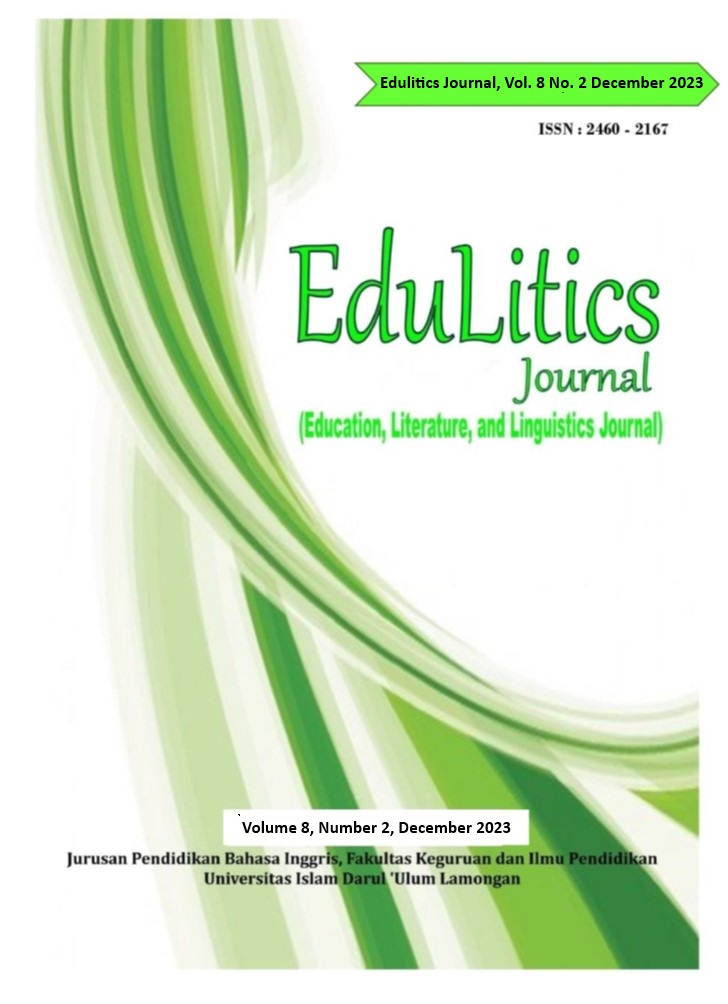Hello English Application to Improve the Students' Speaking Skills
Abstract
The context of this study is that students' ability to speak English is quite concerning. Students' interest in speaking English is relatively low due to a lack of mastery of vocabulary, and a fear of making mistakes in pronunciation, so they rarely practice it. Students become bored learning English, so their interest in English lessons decreases. Descriptive qualitative research methodologies are used in the research. The research population consisted of MAS PAB 1 Sampali students with a total sample size of 31. The researcher chose 11 students using a purposive sampling technique, in which the sample was determined based on the selection of information sources rather than the number of participants. Methods for gathering data include observation, interviews, and documentation. Data processing involves the reduction of data, the display of data, and the drawing/verification of conclusions. The study's findings are (1) students' perceptions of using the Hello English application revealed that as many as 98% of students believed the application could help improve students' speaking skills, (2) students used Technology progress very well by using it to learn, one of which was using the Hello English application, (3) the Hello English application was very efficient for teachers in helping teach speaking English in class. Based on research findings, the Hello English application is very useful and effective in teaching and learning activities, owing to its easy and practical access on any device, as well as fun features for students that keep them interested in learning English in the future.
Downloads
References
Daulay, S. H., Daulay, E., & Tanjung, M. (2022). Student Difficulties in Learning Speaking. LPP Balai Insan Cendekia.
Daulay, S. H., Daulay, N. K., Daulay, A. H., Reflina, R., Maysarah, S., & Khairunnisa, D. (2021). Online Learning Problems in the Covid-19 Pandemic for English Education Students. AL-ISHLAH: Jurnal Pendidikan, 13(3), 2373-2380.
Daulay, S. H., Faridah, F., Shaumiwaty, S., & Kurniati, E.Y. (2021). How to Enlarge Students’ Literacy Culture in the Digital Era? Prosiding Nasional Pendidikan: LPPM IKIP PGRI Bojonegoro, 2(1), 80-84.
Daulay, S. H., Lubis, Y., Damanik, E. S. D., Wandini, R. R., & Putri, F. A. (2021). Does Pictionary Game Effective For Students’ Speaking Skill. Journal of English Language Teaching and Linguistics, 13.
Daulay, S. H., Salmiah, M., & Ulfa, Z. (2019, February). Students’ speaking skill through cooperative learning strategy: Time token arends. In Third International Conference of Arts, Language, and Culture (ICALC 2018) (pp. 388-393). Atlantis Press.
Fitriyadi, H. (2013). Integrasi teknologi informasi komunikasi dalam pendidikan: potensi manfaat, masyarakat berbasis pengetahuan, pendidikan nilai, strategi implementasi dan pengembangan profesional. Jurnal Pendidikan Teknologi dan Kejuruan, 21(3).
Grognet, A. G. (1997). Definition of Speaking Skill. London, Providence: Jamastown Publisher.
Hidayati, T., & Diana, S. (2019). Students’ motivation to learn English using mobile applications: The case of Duolingo and Hello English. JEELS (Journal of English Education and Linguistics Studies), 6(2), 189-213.
Hussain, Z. (2018). The Effects of ICT-Based Learning on Students’ Vocabulary Mastery in Junior High Schools in Bandung. International Journal of Education, 10(2), 149-156.
Ibnu, S. N. J. (2020). Hello English Aapplication as Supporting Device in English Learning Speaking Skill (Doctoral dissertation, IAIN Ponorogo).
Khairisya, T., & Daulay, S. H. (2022). Using Kahoot! as A Media in English Teaching: Students’ perception. In International Seminar on Language, Education, and Culture (ISoLEC) (Vol. 6, No. 1, pp. 196-202).
Leong, L. M., & Ahmadi, S. M. (2017). An analysis of factors influencing learners’ English-speaking skill. International Journal of Research in English Education.
Maimanah, H. (2020). The Students' Perception on the Use of Hello English. Undergraduate Thesis, Tarbiyah dan Keguruan.
Meutia, C. I., Wiandari, F., & Husaini, A. H. (2020). Problematika Non-Linguistik Siswa Dalam Berbicara Bahasa Inggris. Jurnal Pena Edukasi, 7(2), 81-89.
Mikre, F. (2011). The role of information communication, Ethiop. J. Educ. & Science, 6(2), 111-126.
Naciri, H. (2019, November). The use of ICTs to enhance students’ speaking skills. In Conference Proceedings. Innovation in Language Learning 2019.
Nugrahani, F., & Hum, M. (2014). Metode penelitian kualitatif. Solo: Cakra Books. 1(1), 3-4.
Paryanti, A. B. (2021). Makalah penggunaan ICT dalam meningkatkan mutu pembelajaran. JSI (Jurnal Sistem Infromasi) Universitas Suryadarma, 1(1).
Prihatiningsih, W., Setiadarma, A., & Maliki, M. (2023). Pelatihan dan Implementasi Public Speaking di Kalangan Siswa SMA. Ikra-Ith Abdimas, 6(2), 183-192.
Puspahaty, N. (2014). Pengaruh Penggunaan Strategi Interaktif Terhadap Kemampuan Berbicara Siswa. Makna: Jurnal Kajian Komunikasi, Bahasa, dan Budaya, 5(1), 60-63.
Rao, P. S. (2019). The importance of speaking skills in english classrooms. Alford Council of International English & Literature Journal (ACIELJ), 2(2), 6-18.
Sari, L., & Lestari, Z. (2019, February). Meningkatkan kemampuan berbicara bahasa Inggris siswa dalam menghadapi era revolusi 4.0. In Prosiding Seminar Nasional Program Pascasarjana Universitas PGRI Palembang. 12, (1).
Seroja, R., & Fithriani, R. (2021). Using the Hello English Application in the EFL Classroom: Its Efficacy in Helping Students to Master Vocabulary. In Annual International Conference of Language and Literacy (Vol. 2021). Knowledge E.
Siregar, S. D., Sari, S. M., Simamora, D. F. (2020). Using Application Based on Smartphone Android “Hello English” To Increase Students’ English Competency. English Education: English Journal for Teaching and Learning, 8(01), 47-56.
Sugiyono, D. (2010). Metode penelitian kuantitatif dan R&D. Bandung: Alfabeta, 26-33.
Syafitri, A., Yundayani, A., & Kusumajati, W. K. (2019, November). Hubungan antara kepercayaan diri siswa terhadap kemampuan berbicara Bahasa Inggris. In Prosiding Seminar Nasional Pendidikan STKIP Kusuma Negara.
Tanjung, A. P., & Daulay, S.H. (2022, June). Quizlet And Vocabulary Mastery: Students’ Perception. In English Language and Literature International Conference (ELLiC) Proceedings (Vol. 5, pp. 267-276).
Tanjung, A.P., Daulay, S.H. (2023). Exploring Students' Perceptions of Using the Application Online Dictionary. Jurnal Ilmu Pendidikan (JIP). STKIP Kusuma Negara. Vol.15 no.1, 84-90.
Wahyono, H. (2017). Penilaian Kemampuan Berbicara di Perguruan Tinggi Berbasis Teknologi Informasi Wujud Aktualisasi Prinsip-Prinsip Peilaian. Transformatika: Jurnal Bahasa, Sastra, dan Pengajarannya, 1(1), 19-34.
Zahro, S. K. (2021). Unintelligible Speech: Listeners' Awareness to Indonesian-Accented Speech with Pronunciation Errors. Language Literacy: Journal of Linguistics, Literature and Language Teaching, 5(1).

This work is licensed under a Creative Commons Attribution-ShareAlike 4.0 International License.
Authors retain copyright and grant the journal the right of first publication with the work simultaneously licensed under a Creative Commons Attribution-ShareAlike 4.0 International License that allows others to share the work with an acknowledgment of the work's authorship and initial publication in this journal.
Authors are able to enter into separate, additional contractual arrangements for the non-exclusive distribution of the journal's published version of the work (e.g., post it to an institutional repository or publish it in a book), with an acknowledgment of its initial publication in this journal.
Authors are permitted and encouraged to post their work online (e.g., in institutional repositories or on their website) before and during the submission process, as it can lead to productive exchanges and earlier and greater citation of published work.






_(1).png)


